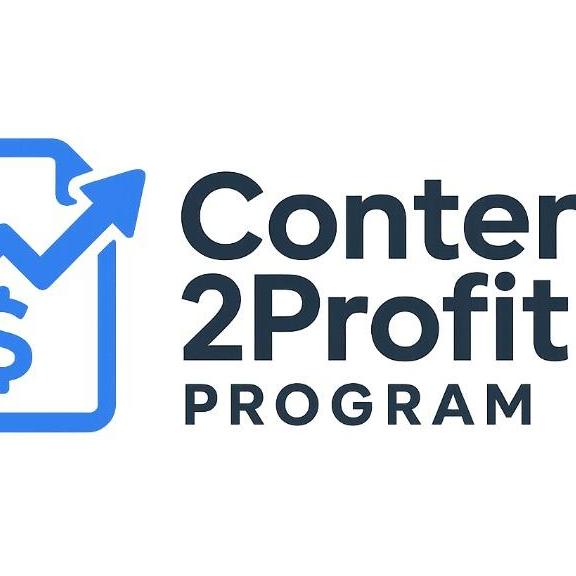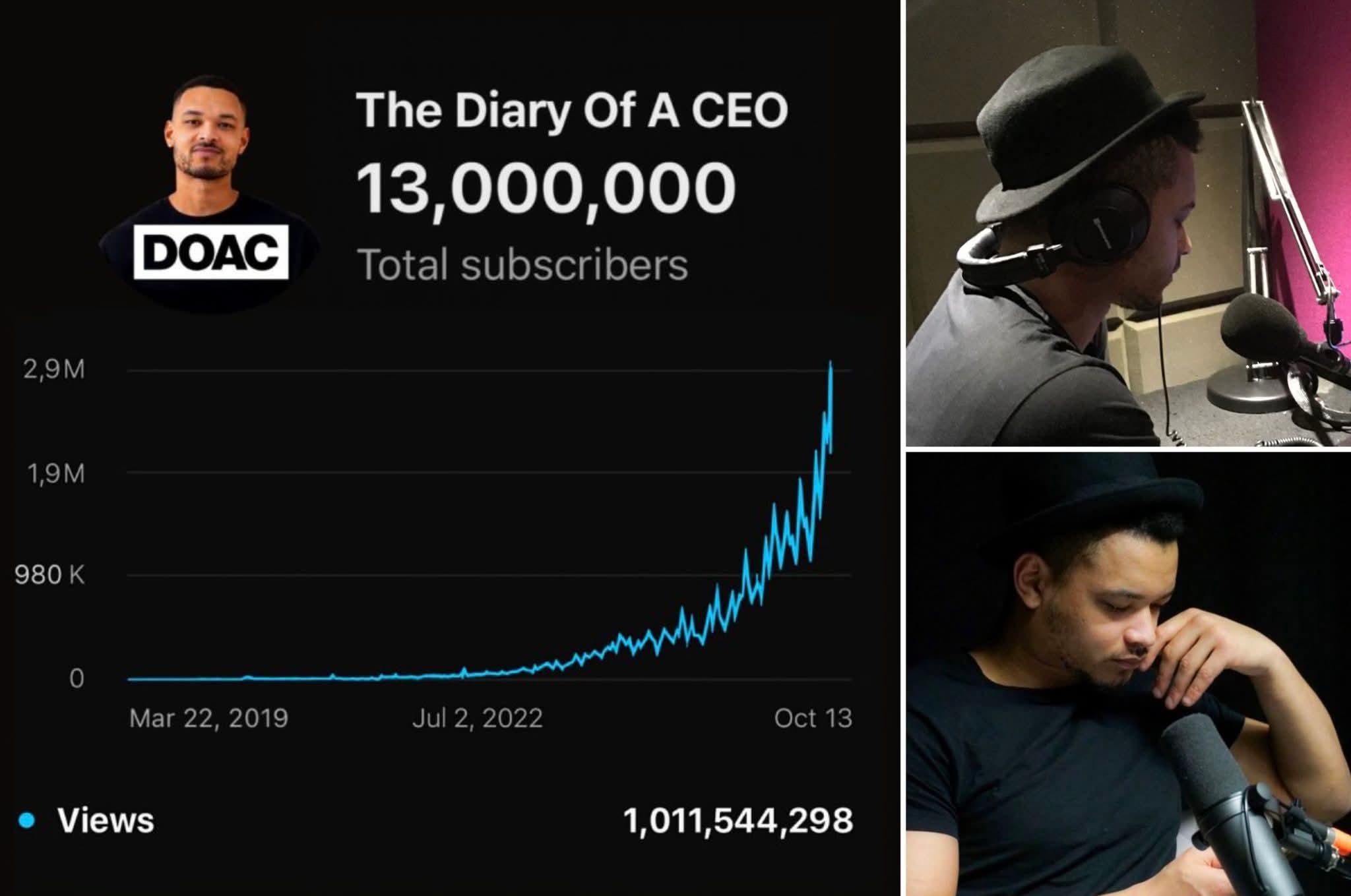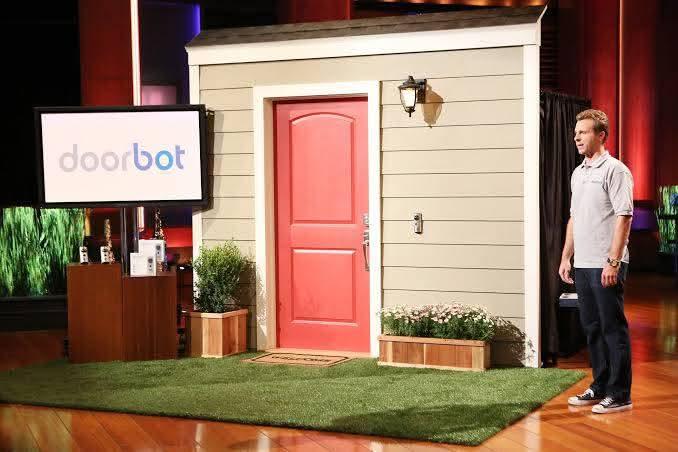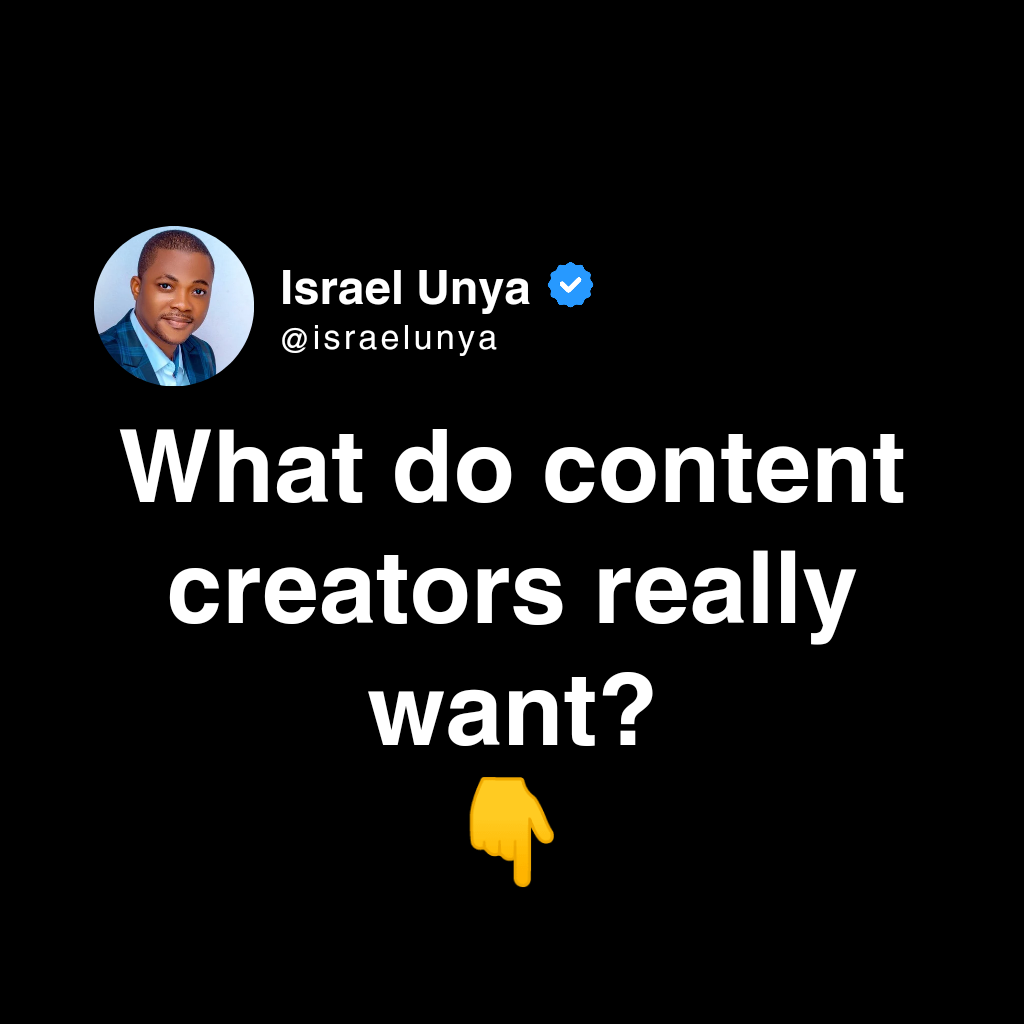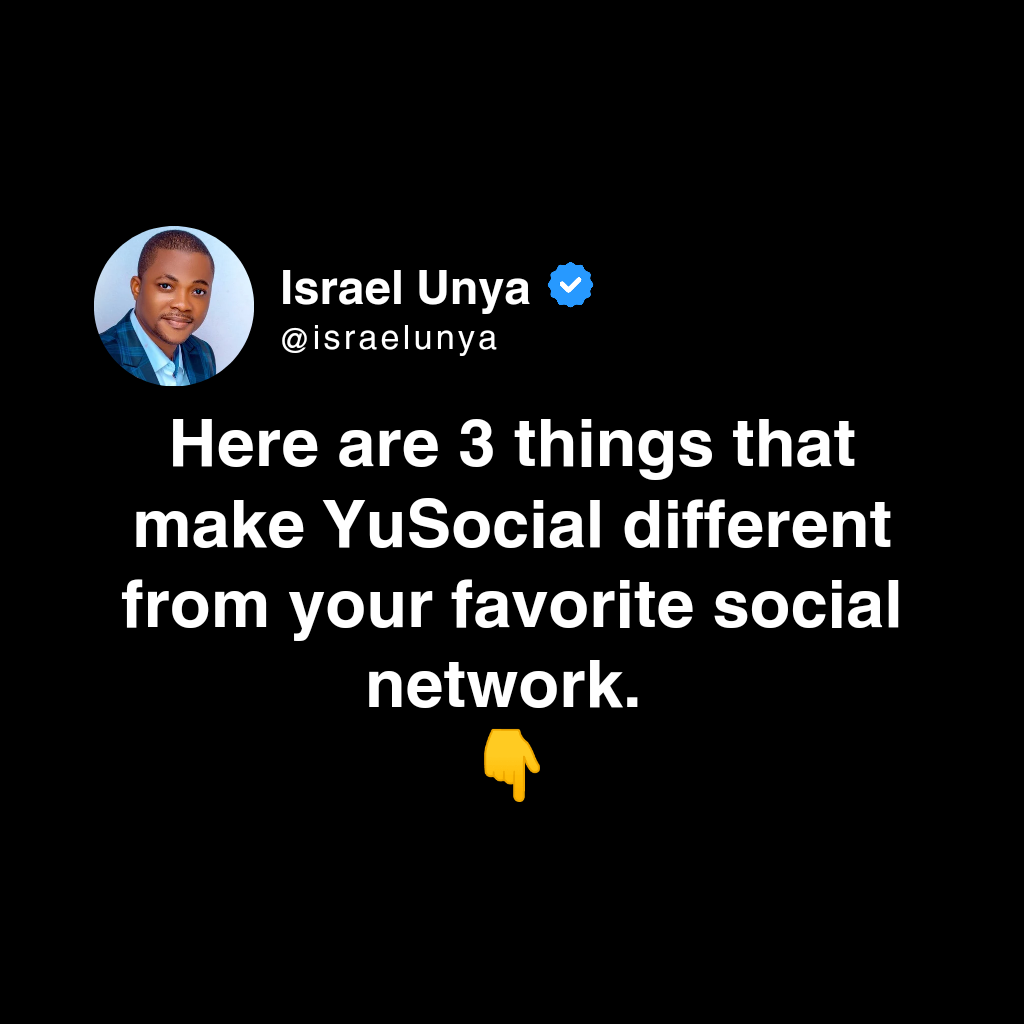I am a seasoned Digital Growth Strategist.
I help new and established businesses accelerate their growth by transforming their digital presence and operations through strategic technology implementation and optimization.
Let's Connect
If you're looking to grow your online business through effective digital marketing, let's connect!
Leave me a message here and we'll work together to help your business grow.
I help new and established businesses accelerate their growth by transforming their digital presence and operations through strategic technology implementation and optimization.
Let's Connect
If you're looking to grow your online business through effective digital marketing, let's connect!
Leave me a message here and we'll work together to help your business grow.
-
109 Posts
-
57 Photos
-
3 Videos
-
Male
-
Married
-
Followed by 87 people
Recent Updates
-
Now Ezra's matter has been brought to the fore, let's use the opportunity to do some introspection.
Are there habits/associations/lifestyle (past or present) that could jeopardize the beautiful future you are striving hard to create?Now Ezra's matter has been brought to the fore, let's use the opportunity to do some introspection. Are there habits/associations/lifestyle (past or present) that could jeopardize the beautiful future you are striving hard to create?0 Comments 0 Shares 473 ViewsPlease log in to like, share and comment! -
At the 042 Startups October Meet & Greet over the weekend.At the 042 Startups October Meet & Greet over the weekend.0 Comments 0 Shares 1K Views
-
Steve Bartlett wrote:
In 2017, I started a podcast in my bedroom that nobody listened to - that decision became the most consequential I've ever made. Here's my non-AI-slop advice for every creator...
1️⃣ The first thing...
It's so cliché that it almost makes me want to cringe typing this, but honestly - the precursor to doing anything at a high level is creating what I call "the conditions to out-persist"
And the most critical condition to out-persist at something is enjoying the thing
If you're not going to love it for 10 years, without the need for commercial incentive, there's a significant possibility you're not going to hang in there long enough to FAIL - LEARN - IMPROVE - GROW
*Look at the graph below for a window into how long I podcasted before people showed up - for context In the last 90 days our growth trajectory has increased significantly - we added more new subscribers in the last 90 days (2 million±) than we had in the first 900 days!*
Therefore, the first question one has to be: "Do I love this enough to give it a decade of my life?"
Once you're an adult, you only get about 6 or 7 decades.
Is this mission worth one of those precious decades?
If so, all you need is time. If you don't, stop wasting it.
2️⃣ The second thing...
TEAM, TEAM, TEAM
Nothing will sway your outcomes more than WHO you choose to align with
In business and in life:
The best decisions you make will be people
The worst decisions you make will be people
Steve Jobs once said the product he was most proud of making was "THE TEAM" and I feel the same way
I now have 100+ people behind me at FLIGHTSTORY who are truly the champions league of this industry - bound by obsession, detail orientation, and unapologetically hard-working to the point that you'd probably call us all toxic and we'd probably take that as a compliment 🤷🏽♂️
3️⃣ The last thing...
Don't take it all so seriously...
As a creator, you exist in a constant storm of feedback - praise, criticism, advice, attacks, all of it coming at you 24/7
This sounds weird, but one of the most clarifying thoughts that's helped me deal with the feedback is realising that I'm going to die someday, and that day is relatively soon
There's something about understanding that this is just a moment in time - accepting the paradox that your impact has very real consequences now, but at the same time, in the grand scheme of the grand scheme, you're going to be nothing more than a memory in a few loved ones minds - that liberates you from worry and enables you to do YOU with all of your heart
Thank you for enabling me & 100+ of my team here in the UK to have a job we love just by tuning in and supporting us. Today we're celebrating our community hitting 13,000,000 subscribers on Youtube!
P.S... if you're starting out, please just compare yourself today, to yourself yesterday! Thank god I didn't compare myself to the best in the industry back in 2017... If I had, I probably would never have started.Steve Bartlett wrote: In 2017, I started a podcast in my bedroom that nobody listened to - that decision became the most consequential I've ever made. Here's my non-AI-slop advice for every creator... 1️⃣ The first thing... It's so cliché that it almost makes me want to cringe typing this, but honestly - the precursor to doing anything at a high level is creating what I call "the conditions to out-persist" 🐢 And the most critical condition to out-persist at something is enjoying the thing If you're not going to love it for 10 years, without the need for commercial incentive, there's a significant possibility you're not going to hang in there long enough to FAIL - LEARN - IMPROVE - GROW *Look at the graph below for a window into how long I podcasted before people showed up - for context In the last 90 days our growth trajectory has increased significantly - we added more new subscribers in the last 90 days (2 million±) than we had in the first 900 days!* Therefore, the first question one has to be: "Do I love this enough to give it a decade of my life?" Once you're an adult, you only get about 6 or 7 decades. Is this mission worth one of those precious decades? If so, all you need is time. If you don't, stop wasting it. 2️⃣ The second thing... TEAM, TEAM, TEAM Nothing will sway your outcomes more than WHO you choose to align with In business and in life: The best decisions you make will be people The worst decisions you make will be people Steve Jobs once said the product he was most proud of making was "THE TEAM" and I feel the same way I now have 100+ people behind me at FLIGHTSTORY who are truly the champions league of this industry - bound by obsession, detail orientation, and unapologetically hard-working to the point that you'd probably call us all toxic and we'd probably take that as a compliment 🤷🏽♂️ 3️⃣ The last thing... Don't take it all so seriously... As a creator, you exist in a constant storm of feedback - praise, criticism, advice, attacks, all of it coming at you 24/7 This sounds weird, but one of the most clarifying thoughts that's helped me deal with the feedback is realising that I'm going to die someday, and that day is relatively soon There's something about understanding that this is just a moment in time - accepting the paradox that your impact has very real consequences now, but at the same time, in the grand scheme of the grand scheme, you're going to be nothing more than a memory in a few loved ones minds - that liberates you from worry and enables you to do YOU with all of your heart Thank you for enabling me & 100+ of my team here in the UK to have a job we love just by tuning in and supporting us. Today we're celebrating our community hitting 13,000,000 subscribers on Youtube! ❤️ P.S... if you're starting out, please just compare yourself today, to yourself yesterday! Thank god I didn't compare myself to the best in the industry back in 2017... If I had, I probably would never have started.0 Comments 0 Shares 1K Views -
When I was a little boy, I was always traumatized by the sight of onions in my food.
If my mum was not looking, I would start with an onions-cleansing ritual before dealing with the food.
Now I'm older, I wonder what the world would be like without it.
Do you know that the reason onions has its shape is because it makes the world go round?
Onions is life. Onions was created before sliced bread.
A life without onions is a life of oblivion.
...well, there you have it - my one minute of idleness.
I pray this would be the last you catch me in this state.
PS: What's your own story? What traumatized you when you were much younger that you are now a crusader of?When I was a little boy, I was always traumatized by the sight of onions in my food. If my mum was not looking, I would start with an onions-cleansing ritual before dealing with the food. Now I'm older, I wonder what the world would be like without it. Do you know that the reason onions has its shape is because it makes the world go round? Onions is life. Onions was created before sliced bread. A life without onions is a life of oblivion. ...well, there you have it - my one minute of idleness. I pray this would be the last you catch me in this state. PS: What's your own story? What traumatized you when you were much younger that you are now a crusader of?0 Comments 0 Shares 1K Views -
She walked onto Shark Tank nine months pregnant and nearly broke.
Five years later, PepsiCo bought her company for $1.95 billion.
Meet Allison Ellsworth, the woman who turned a gut health problem into a global soda revolution.
Back then, Allison was working in oil and gas.
Constant travel. Terrible diet. Her gut was in chaos.
So she started taking shots of apple cider vinegar every morning.
It worked — but it tasted awful.
Everyone around her said:
“Stick to your stable job.”
“The market’s too crowded.”
“You’re pregnant — this is a terrible time to start anything.”
She didn’t listen.
Because Allison knew one thing others didn’t:
If she could make apple cider vinegar taste good, everyone else would want it too.
So she got to work — in her kitchen.
Mixing vinegar, fruit juice, and sparkling water.
Her husband, Stephen, rigged up a carbonation line in their Dallas townhouse.
They bottled it and called it Mother Beverage.
In 2016, three months pregnant, she quit her job to sell it at farmers markets.
They almost went broke.
No air conditioning in their car or facility.
Texas heat. Side jobs. Sweat and faith.
But they sold out every single week.
Then — a miracle.
A Whole Foods buyer stumbled upon their stand.
“I don’t do this often,” she said. “But you belong in Whole Foods.”
That one moment flipped the script.
Fast forward to 2018 — Allison auditions for Shark Tank.
Six months of interviews, paperwork, and secrecy.
She films the episode nine months pregnant, gives birth ten days later,
and lands a deal with Rohan Oza: $400,000 for 25%.
Then came the harshest — and best — feedback ever:
“Your branding is ****.”
Instead of folding, Allison rebuilt.
New look. New name. New mission.
Mother Beverage became Poppi — “a new kind of soda for the next generation.”
They relaunched in March 2020 — in the middle of COVID and an aluminum shortage.
Most startups would’ve died there.
Allison hit record. Posted her story on TikTok.
Woke up to $100,000 in Amazon sales overnight.
That video has over 90 million views.
Poppi now has more than 2 billion TikTok views, a Super Bowl ad, and $500 million in annual revenue.
In May 2025, PepsiCo acquired Poppi for $1.95 billion.
All because one woman refused to believe that “healthy” had to taste bad —
or that bad timing meant failure.
She turned a kitchen experiment into an empire.
She proved that criticism can be the start of something legendary.
So ask yourself:
What “crazy” idea are you sitting on?
What “bad timing” are you hiding behind?
Allison built Poppi pregnant, broke, and doubted by everyone.
No funding. No background in beverages. Just conviction.
Sometimes, your worst timing is actually your best opportunity.
Sometimes, your lack of experience is your unfair advantage.
Find your kitchen. Mix your ingredients.
Make your own version of Poppi.
Because the next billion-dollar brand might just be sitting on your counter —
waiting for you to believe it’s possible.She walked onto Shark Tank nine months pregnant and nearly broke. Five years later, PepsiCo bought her company for $1.95 billion. Meet Allison Ellsworth, the woman who turned a gut health problem into a global soda revolution. Back then, Allison was working in oil and gas. Constant travel. Terrible diet. Her gut was in chaos. So she started taking shots of apple cider vinegar every morning. It worked — but it tasted awful. Everyone around her said: “Stick to your stable job.” “The market’s too crowded.” “You’re pregnant — this is a terrible time to start anything.” She didn’t listen. Because Allison knew one thing others didn’t: If she could make apple cider vinegar taste good, everyone else would want it too. So she got to work — in her kitchen. Mixing vinegar, fruit juice, and sparkling water. Her husband, Stephen, rigged up a carbonation line in their Dallas townhouse. They bottled it and called it Mother Beverage. In 2016, three months pregnant, she quit her job to sell it at farmers markets. They almost went broke. No air conditioning in their car or facility. Texas heat. Side jobs. Sweat and faith. But they sold out every single week. Then — a miracle. A Whole Foods buyer stumbled upon their stand. “I don’t do this often,” she said. “But you belong in Whole Foods.” That one moment flipped the script. Fast forward to 2018 — Allison auditions for Shark Tank. Six months of interviews, paperwork, and secrecy. She films the episode nine months pregnant, gives birth ten days later, and lands a deal with Rohan Oza: $400,000 for 25%. Then came the harshest — and best — feedback ever: “Your branding is shit.” Instead of folding, Allison rebuilt. New look. New name. New mission. Mother Beverage became Poppi — “a new kind of soda for the next generation.” They relaunched in March 2020 — in the middle of COVID and an aluminum shortage. Most startups would’ve died there. Allison hit record. Posted her story on TikTok. Woke up to $100,000 in Amazon sales overnight. That video has over 90 million views. Poppi now has more than 2 billion TikTok views, a Super Bowl ad, and $500 million in annual revenue. In May 2025, PepsiCo acquired Poppi for $1.95 billion. All because one woman refused to believe that “healthy” had to taste bad — or that bad timing meant failure. She turned a kitchen experiment into an empire. She proved that criticism can be the start of something legendary. So ask yourself: What “crazy” idea are you sitting on? What “bad timing” are you hiding behind? Allison built Poppi pregnant, broke, and doubted by everyone. No funding. No background in beverages. Just conviction. Sometimes, your worst timing is actually your best opportunity. Sometimes, your lack of experience is your unfair advantage. Find your kitchen. Mix your ingredients. Make your own version of Poppi. Because the next billion-dollar brand might just be sitting on your counter — waiting for you to believe it’s possible.0 Comments 0 Shares 1K Views -
The worst product ever pitched on Shark Tank put traditional home security out of business and sold to Amazon for over a billion dollars.
Jamie Siminoff had a problem.
He was working in his garage. Building stuff. Inventing things.
But he kept missing package deliveries.
Simple problem. Should have been a simple solution.
But there wasn’t one.
So he built a doorbell with a camera. Let you see who was at your door from your phone.
Called it DoorBot.
Started selling them. A few hundred units. Then a few thousand.
But he needed money to scale. To manufacture. To grow.
So he did what everyone does when they need exposure.
Applied to Shark Tank.
1. He walked into that studio thinking this was his shot.
The sharks watched his pitch. Tried the product. Asked their questions.
Then one by one, they all said no.
Kevin O’Leary was brutal. Said it was one of the worst products he’d ever seen on the show.
Mark Cuban passed. Said the market wasn’t big enough.
All five sharks out.
Siminoff walked out of there with nothing. Zero dollars. Zero deals.
The episode aired a few months later. Millions of people watched him get rejected on national television.
Most people would have quit. Packed it in. Said the sharks were right.
Siminoff didn’t quit.
Here’s what he understood that the sharks missed:
The product wasn’t the problem. The timing was just early. People weren’t ready yet.
So he kept working.
Renamed DoorBot to Ring. Better name. Clearer message.
Kept improving the product. Made it better. Made it cheaper. Made it easier to use.
Kept selling. Direct to consumers. Built a following. Grew slowly.
And then something happened.
Crime started rising in neighborhoods. Package theft became a real problem.
People wanted security. Wanted to see who was at their door. Wanted proof when things got stolen.
Suddenly Ring wasn’t just a convenience. It was a necessity.
Sales exploded.
Siminoff raised money. Real money. Built out the product line. Added new features.
By 2018, Ring was doing hundreds of millions in revenue.
That’s when Amazon came calling.
Bought the company for over 1 billion dollars.
The same product Kevin O’Leary called one of the worst ever was now worth a billion dollars.
The same idea every shark passed on was now changing home security forever.
Today, Ring is in millions of homes. The name became synonymous with video doorbells.
And Kevin O’Leary admits it on TV every time someone brings it up. His biggest miss. The one that got away.
All because a guy in a garage refused to believe that five rejections meant he was wrong.
He proved that being too early looks exactly like being wrong.
He showed that expert opinion is just opinion. Not fact.
He demonstrated that the market tells you if you’re right. Not investors. Not sharks. Not critics.
What product are you sitting on because someone told you it wouldn’t work?
What idea did you kill because an expert said no?
Siminoff got rejected on national television by five successful investors.
He went back to his garage and kept building.
He waited for the market to catch up to his idea.
He turned the biggest public rejection into the biggest public win.
Because he understood something most people don’t.
No doesn’t mean never. It just means not yet.
Rejection doesn’t define your product. The market does.
Stop letting experts tell you what will or won’t work. Experts are wrong all the time.
Start thinking like Jamie Siminoff.
Build your product. Test your market. Prove them wrong.
Work through the rejections. Work through the doubts. Work until the world catches up.
And never let anyone tell you that their no is your final answer.
Sometimes the worst pitch on Shark Tank becomes the billion-dollar exit.
Because when the sharks say no, the market might say yes.
Think Big.
#SharedAsReceivedThe worst product ever pitched on Shark Tank put traditional home security out of business and sold to Amazon for over a billion dollars. Jamie Siminoff had a problem. He was working in his garage. Building stuff. Inventing things. But he kept missing package deliveries. Simple problem. Should have been a simple solution. But there wasn’t one. So he built a doorbell with a camera. Let you see who was at your door from your phone. Called it DoorBot. Started selling them. A few hundred units. Then a few thousand. But he needed money to scale. To manufacture. To grow. So he did what everyone does when they need exposure. Applied to Shark Tank. 1. He walked into that studio thinking this was his shot. The sharks watched his pitch. Tried the product. Asked their questions. Then one by one, they all said no. Kevin O’Leary was brutal. Said it was one of the worst products he’d ever seen on the show. Mark Cuban passed. Said the market wasn’t big enough. All five sharks out. Siminoff walked out of there with nothing. Zero dollars. Zero deals. The episode aired a few months later. Millions of people watched him get rejected on national television. Most people would have quit. Packed it in. Said the sharks were right. Siminoff didn’t quit. Here’s what he understood that the sharks missed: The product wasn’t the problem. The timing was just early. People weren’t ready yet. So he kept working. Renamed DoorBot to Ring. Better name. Clearer message. Kept improving the product. Made it better. Made it cheaper. Made it easier to use. Kept selling. Direct to consumers. Built a following. Grew slowly. And then something happened. Crime started rising in neighborhoods. Package theft became a real problem. People wanted security. Wanted to see who was at their door. Wanted proof when things got stolen. Suddenly Ring wasn’t just a convenience. It was a necessity. Sales exploded. Siminoff raised money. Real money. Built out the product line. Added new features. By 2018, Ring was doing hundreds of millions in revenue. That’s when Amazon came calling. Bought the company for over 1 billion dollars. The same product Kevin O’Leary called one of the worst ever was now worth a billion dollars. The same idea every shark passed on was now changing home security forever. Today, Ring is in millions of homes. The name became synonymous with video doorbells. And Kevin O’Leary admits it on TV every time someone brings it up. His biggest miss. The one that got away. All because a guy in a garage refused to believe that five rejections meant he was wrong. He proved that being too early looks exactly like being wrong. He showed that expert opinion is just opinion. Not fact. He demonstrated that the market tells you if you’re right. Not investors. Not sharks. Not critics. What product are you sitting on because someone told you it wouldn’t work? What idea did you kill because an expert said no? Siminoff got rejected on national television by five successful investors. He went back to his garage and kept building. He waited for the market to catch up to his idea. He turned the biggest public rejection into the biggest public win. Because he understood something most people don’t. No doesn’t mean never. It just means not yet. Rejection doesn’t define your product. The market does. Stop letting experts tell you what will or won’t work. Experts are wrong all the time. Start thinking like Jamie Siminoff. Build your product. Test your market. Prove them wrong. Work through the rejections. Work through the doubts. Work until the world catches up. And never let anyone tell you that their no is your final answer. Sometimes the worst pitch on Shark Tank becomes the billion-dollar exit. Because when the sharks say no, the market might say yes. Think Big. #SharedAsReceived0 Comments 0 Shares 1K Views1
-
Ever wondered why AI platforms like ChatGPT, Google SGE, and Perplexity often cite blogs instead of traditional social media posts?
In this video, I break down the importance of blog-style content, how search engines and AI pull from authoritative sources, and why YuSocial’s publishing feature helps your content stand out and get cited.
https://youtu.be/lTV9K4LMiN4Ever wondered why AI platforms like ChatGPT, Google SGE, and Perplexity often cite blogs instead of traditional social media posts? In this video, I break down the importance of blog-style content, how search engines and AI pull from authoritative sources, and why YuSocial’s publishing feature helps your content stand out and get cited. https://youtu.be/lTV9K4LMiN4 0 Comments 0 Shares 1K Views
0 Comments 0 Shares 1K Views -
Sometimes, we limit ourselves to local, while we should be playing global.Sometimes, we limit ourselves to local, while we should be playing global.0 Comments 0 Shares 894 Views
-
Why AI Platforms Cite Blogs (and How YuSocial Articles Get Featured Too)Artificial intelligence is quickly becoming the new gateway to information. Tools like ChatGPT, Perplexity, and Google’s Search Generative Experience (SGE) are reshaping how people get answers online. But here’s the catch: not every type of content gets cited by these AI platforms. If you’ve been wondering why your Facebook or Instagram posts don’t show up in AI...0 Comments 0 Shares 2K Views
-
I have gotten the commitment of our resource person to have a virtual session with us regarding the new tax law.
Details will be made available shortly.I have gotten the commitment of our resource person to have a virtual session with us regarding the new tax law. Details will be made available shortly.0 Comments 0 Shares 1K Views -
What do content creators really want? #yusocial #monetization6 Comments 0 Shares 2K Views1

-
More Stories











